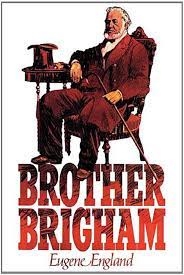Articles/Essays – Volume 14, No. 1
Brigham as Moses | Eugene England, Brother Brigham
The major theme of Eugene England’s biography is the flowering of Brigham Young’s personality. His strict Methodist upbringing suppressed Brigham’s natural forces and made him a watchful, cautious, somewhat skeptical young man. The Gospel, Joseph Smith, and the trek into the western desert opened and developed Brigham’s personal resources. By the end of his life, he was a profoundly eloquent, forceful, and ingenious leader, in touch with instincts and feelings inaccessible to him at age twenty-five.
This major theme is interwoven with the minor theme, the development of the Mormon people into a Zion society. To emphasize the similarities with ancient Israel, two chapters are entitled, “Brigham as Moses.” Brigham’s character grew out of his relentless desire to mold the diverse group of converts flowing to Mormon centers into a disciplined and devoted holy nation. People and leader matured together.
Brigham Young’s success in accomplishing his mission, the book informs us, was only possible because he was not the man we commonly suppose him to be. Biographies of Brigham Young have wrongly depicted him as “a stoic polygamist and tough, practical administrator who conquered the desert.” Eugene England persuades us that Joseph Smith was a better administrator and Brigham Young more of a visionary than we have thought. Why else did Brigham himself give Joseph the credit for teaching his successor how to organize a people for action? And why Brigham’s extraordinary exertion to finish the Nauvoo temple and endow the Saints on the eve of evacuation if practicality alone was his guiding principle. The Zion people would never have come into being without a prophet to inspire them with a vision of the City of God.
It is improper to ask if Eugene England has given us the complete Brigham Young. The preface forewarns us that polygamy and Mormon-Indian relations, among other topics, are excluded. “A small volume of rather personal essays can only begin to touch a few dimensions of such a large life.” The mode is appropriate. The personal biographical essay—one individual reacting to the qualities perceived in another—is perhaps the best way to draw out all that this vast man contained.
So it is that Eugene England, a student and critic of literature, can insightfully describe Brigham Young finding his voice as preacher and writer. The famous episode of speaking in tongues at the first meeting with Joseph Smith is seen as signalling the release of Brigham’s eloquence. Previously dammed, it subsequently flowed forth in innumerable pungent, humorous, forceful letters and sermons.
Personal essays are right for a Mormon writing largely for Mormons for still another reason. Besides being an individual of his own time, Brigham Young is a massive figure in the tradition of prophets, extending from Joseph Smith to the present. What we think of Brigham Young affects what we think of his successors, and that relationship is necessarily personal.
Brigham Young, the polygamist, the heavy-handed Great Basin boss, can be hard to embrace as revelator and prophet. He was “strong medicine” for the Saints in his own day. Eugene England softens the sharp edges, or perhaps more accurately shows us another Brigham entirely—intellectual, spiritual, warm, generous, and devoted to his family and the Lord. The notorious feud with Orson Pratt, nowadays turned into a classic encounter of intellectual versus practical man, is passed over, except to say that despite their differences Brigham Young provided for Orson’s family and helped him get teaching jobs. After the Iowa crossing, England says, Brigham “though he certainly always retained his strict toughness and his impatience with weakness and disloyalty . . . never lost the humility and human flexibility he gained there.” By consistently playing up Brigham Young’s humanity, Eugene England helps us to respect and love our second prophet.
The professed aim of Brother Brigham is to present the man from the perspective of love and faith, in the belief that empathy yields a truer picture than hostility. That desire may lead to the neglect of aspects of his life which are difficult for late twentieth-century Mormons to understand. But one troublesome issue is given full attention. The book makes perfectly clear that Brigham Young required complete obedience to the Lord’s prophet. His “perennial problem,” Eugene England tells us, was that “the people needed to trust the leaders enough to follow their counsel not only when it was inspiring, but when it was difficult.” American Saints, instilled with democracy and liberalism, bridle from time to time at the demands of the Mormon prophetic tradition. Such disconcerted souls will find little comfort in Eugene England’s depiction of Brigham Young. Brother Brigham leaves no room to doubt that loyalty and commitment have always been required of the Saints.
Brother Brigham. By Eugene England. Salt Lake City: Bookcraft, Inc., 1980. ix + 256 pp., $5.95.


 Back to full Issue
Back to full Issue

